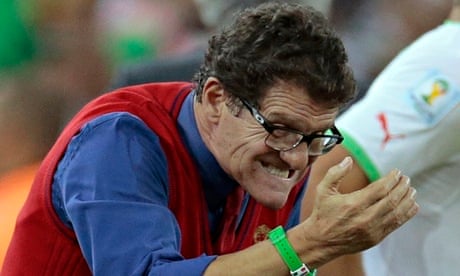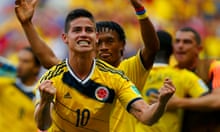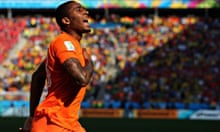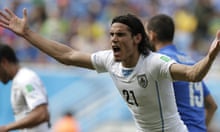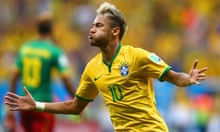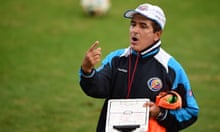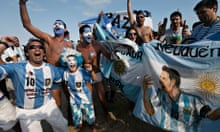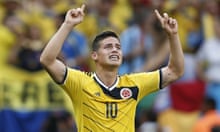Fabio Capello reportedly earns more than quadruple the salary of the managers of Belgium, South Korea and Algeria combined, but was nevertheless unable to lead his Russia team to a victory against any of their opponents in the far from difficult Group H.
Russia leave their first World Cup in 12 years as they left the last one – knocked out at the group stage – and the soul searching now begins for how the country can put together a side capable of a respectable performance in four years when it hosts its first ever World Cup.
It was a truly uninspiring trip to Brazil for the Russians. There was a 1-1 draw with South Korea that provided few exciting moments and in which Igor Akinfeev concede the softest of goals with a horrible goalkeeping error, followed by a late 1-0 defeat against an unimpressive Belgium side.
At least against Algeria on Thursday night, Russia put up a bit of a fight and looked mildly threatening going forward on occasion. But there were still questions about Capello’s tactics: why had he not started Alan Dzagoev, the most exciting attacking player in the squad; why was the striker Aleksandr Kerzhakov taken off towards the end; why was there no sense of urgency that the team was going all out to find a second goal that would have taken them through to the knockout stages?
Capello, asked whether he would still remain at the helm, said: “If they still want me, then yes.” Pundits, however, were unimpressed, with a consensus that even if Russia had somehow carved out an exit from the group, Capello’s uninspiring brand of football would have been hard to justify.
Artur Petrosyan, editor in chief of the Sport Express website, says “obviously” nobody is satisfied with the way Russia play under Capello. “Russia are an average team so why do we need to have the most expensive coach in the world? Why not emulate Chile and at least entertain the fans if success is unachievable?”
Valery Reingold in Sovetsky Sport wrote after the Belgium game that it was “100% Capello’s fault” that the team lost.
“He said it was a great game. Who is Capello trying to kid? I saw no gameplan, just chaos … I don’t understand the logic in his work.”
In the immediate aftermath of the result, Russian football officials appeared far more eager to blast the players rather than apportion any of the blame to the team’s Italian manager, perhaps evidence of the fact that for all the nation’s patriotism, there is often a feeling deep down that something foreign must be better. The side have had foreign coaches since 2006 – first Guus Hiddink and then Dick Advocaat. Capello got the country into their first World Cup for 12 years and it seems like that may be enough for him to keep his job, and his enormous salary, for another four years, and lead the side into their home World Cup in 2018.
“I think Capello is on the right track,” said Vyacheslav Koloskov, a top Russian football official. “But the lack of skill of our players just jumps out at you. So many inaccurate passes, shots and crosses!”
The Football Union’s general secretary, Anatoly Vorobyov, said that Russian football requires “routine, systematic work” to bring it to a new level, and that there is no guarantee that four years will be enough for that work to bear fruit.
“That we are unable to beat Algeria when we have to, that is the objective reality. Let’s admit it. I wouldn’t criticise the players or the trainer, Capello had to work with the players he had,” said Vorobyov.
After the upsurge in patriotism that has accompanied the hosting of the Sochi Winter Olympics and the sporting success at the Games, as well as the annexation of Crimea, it was quite a comedown for many to see the national team knocked out by a north African minnow. But there has been little sense of drama about the World Cup in Russia and, while there were plenty of fans wallowing in despair after Thursday night, the late kick-offs have not helped assuage a general apathy about the tournament.
A survey before the World Cup started, showing that only 7% of Russians thought the team would fail to make it out of the group (and an extraordinary 18% thought Russia would win the tournament), was more likely a sign of ignorance about the tournament than a sign of feverish expectation. Vladimir Putin, who likes to back a winner, said he did not even watch Russia’s game with Belgium.
The columnist Pavel Zanozin complained that Russian fans are only really interested in the team when it begins to do well, unlike what he claimed are “real fans” in England, Germany or Holland. “They are ready to share the pain of defeat with the team, but with us … Do you remember how many people came to see the last friendly with Morocco before the World Cup? 8,000 people. You think that these guys should play for you when basically you don’t give a damn.”
Zanozin repeated what many people have said about Russian football, diagnosing a similar but more chronic version of the problem from which the English Premier League suffers: “We don’t develop youth football, we don’t invest in infrastructure, we want to buy developed footballers and so we lose talented youngsters.”
Russia were the only team in the tournament whose entire squad plays in their domestic league and, in a somewhat telling quote after the game, Akinfeev said the World Cup had come as a shock to the players as the smallest mistake here could lead to a goal: “In the Russian league we are used to playing in a different rhythm. Here people fight right until the end.”
